Gunmen abducted 19 people in Rivers and Imo states, including five students from Rivers State University, yesterday.
This happened on the same day that the House of Representatives requested the federal government to apprehend the murderers of five police officers in the Bauchi village last week.
Following the resignation of Defence Minister Abubakar Badaru on Monday, President Bola Tinubu selected the immediate past Chief of Defence Staff (CDS), General Christopher Musa, as his replacement. He also met with security officials to discuss the country’s security situation.
In the Rivers attack, gunmen suspected of being members of a cult organisation kidnapped at least five students from Rivers State University’s Emohua Satellite Campus early yesterday.
The victims were reportedly taken at gunpoint from their off-campus residence in Emuoha in the Emohua Local Government Area of the state.
It was gathered that students living outside the campus last week protested persistent attacks and harassment by cultists and appealed to the RSU management to relocate them to the main campus in Port Harcourt for safety.
However, at a pre-convocation briefing on Monday, the Vice Chancellor, Prof. Isaac Zeb-Obipi, ruled out closing the Emohua campus or relocating students, stating that the university was addressing security concerns through engagements with community leaders, council authorities, and security agencies.
A student, who narrowly escaped the abduction but pleaded anonymity, said the gunmen invaded their residence around 2 am and shot dead the security dog before proceeding to seize the victims.
“He was running after me and even shot at me; I don’t know how many times. I couldn’t look back because I was focused on escaping.
“Someone from the bush then ran after me. I had to run faster to the gate. Some of our students, about four or so, are missing now,’’ the student said.
The latest incident followed last week’s alleged robbery attack in Rumuji, barely hours after the vice chancellor’s assurances.
Spokesperson of the Rivers State police command, SP Grace Iringe-Koko, confirmed the abduction, describing the perpetrators as cultists.
They were abducted by cultists. In the early hours of Tuesday (yesterday), a group of cultists numbering five stormed an isolated area of Rumuchi/Rumuohia, shot sporadically, and abducted five persons to an unknown destination,” she said.
While disclosing that the police had launched a manhunt for the abductors, the police scribe said, “We have put efforts in place for their safe rescue. As I speak, the commissioner of police has gone there with tactical teams to ensure they regain their freedom.”
Efforts to get the reaction of officials of the state government at press time yesterday proved abortive.
On the attack in Imo, gunmen suspected to be herdsmen reportedly hijacked an Aba-bound bus with 14 passengers at the Ngor Okpala area of Imo State on Monday evening.
Eyewitness accounts said the gunmen emerged from the bush, shot sporadically, and took control of the bus, which had left Owerri for Aba, Abia State.
The situation, according to the witnesses, led to pandemonium, as other vehicles either reversed abruptly or screeched to a halt, while passengers scampered for safety.
“They came out of the bush and started shooting and then kidnapped passengers in a fully loaded bus. Many passengers ran out of their vehicles; some ran into the bush, others ran back. The situation was terrifying,” a source said.
Recall that suspected herders had in May 2025, abducted about 18 passengers in like manner in the same area.
A few weeks after that incident, more than 20 other passengers were reportedly kidnapped in the same area, while two persons were killed in the attack.
The Police Public Relations Officer in the state, Henry Okoye, said the incident was yet to be reported to the command.
“The incident has not been reported to the Police. Nevertheless, the commissioner of police has deployed tactical units to embark on robust fact-finding patrols along the Owerri–Aba Express Road. Further details will be communicated in due course,” Okoye said.
The Sun
Category: Politics
Security Summit Calls for Stronger Inter-Agency Collaboration to Tackle Terrorism
Posted on by admin50
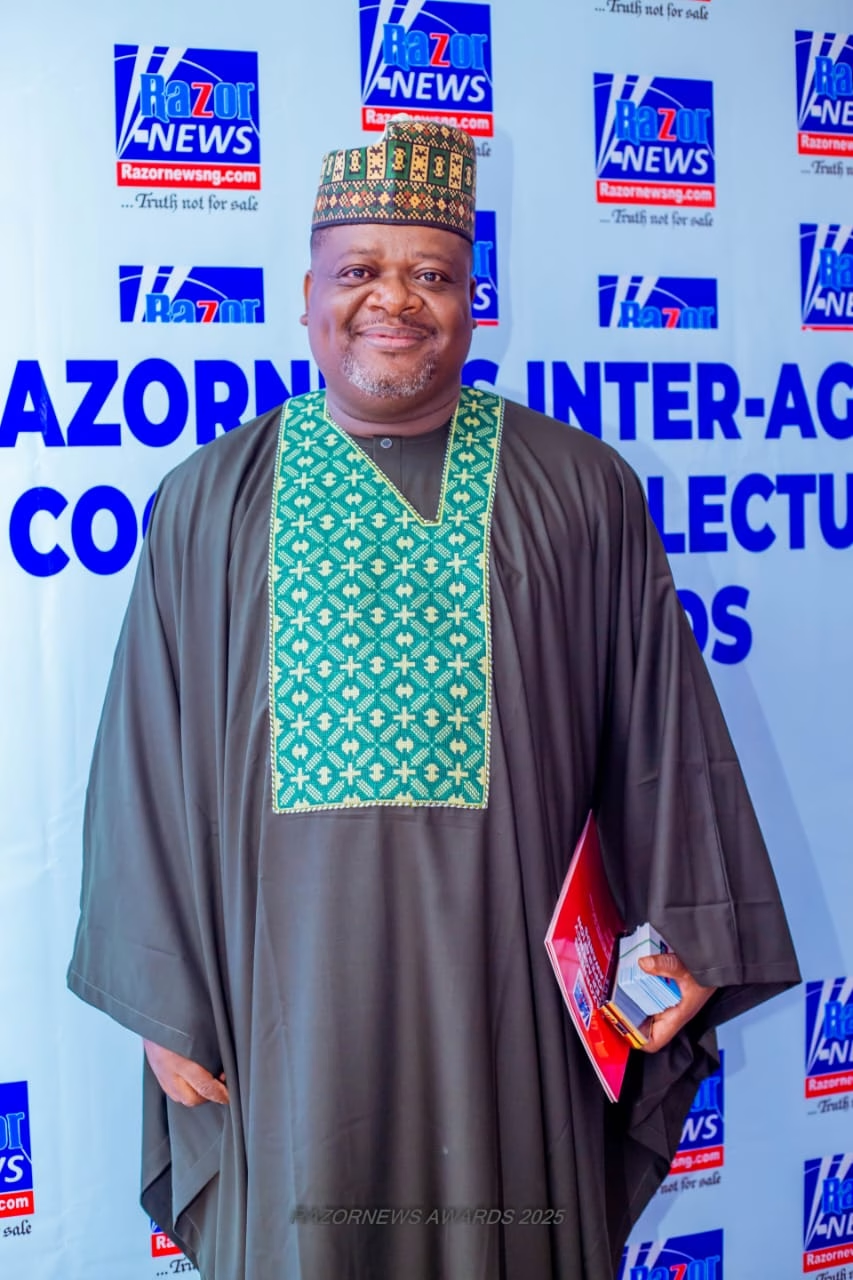
By Ebinum Samuel
Stakeholders in Nigeria’s security architecture on Tuesday renewed the call for stronger institutional collaboration as a critical tool for counter-terrorism and crime control at a one-day inter-agency lecture and awards ceremony organised by Razornews in Lagos.
The conference, themed “Institutional Collaboration as a Tool for Counter-Terrorism and Crime,” was held at the event hall of Shoregate Hotel, GRA, Ikeja, and attracted senior officers from the Nigeria Police Force, Nigerian Immigration Service, Nigeria Security and Civil Defence Corps (NSCDC), Nigerian Correctional Service, Nigerian Customs Service, National Drug Law Enforcement Agency (NDLEA), among other security and safety institutions.
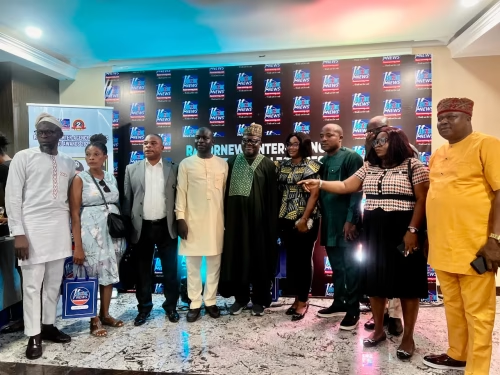
Delivering the keynote address, the Assistant Commandant of Corps (ACC) John Attah Onoja, Commander, Mining Marshal, stressed that no single agency could successfully combat Nigeria’s complex security challenges in isolation. He noted that emerging security threats require coordinated intelligence sharing, joint operations and sustained partnerships across institutions to achieve lasting results.
Also speaking, the Guest Speaker, Dr. Bone Chinye Efoziem, Managing Director of Strict Guard Security Services, underscored the increasing importance of public-private partnerships in internal security. He said private security outfits and host communities must complement government efforts through effective intelligence gathering and early warning systems.
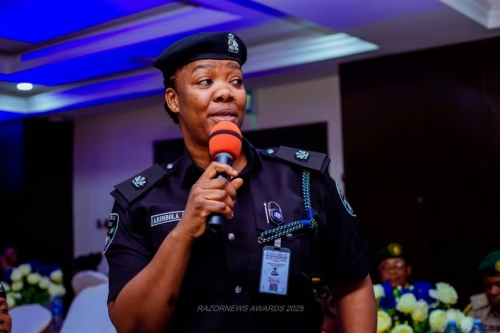
At the end of deliberations, participants issued a communique capturing key resolutions and policy directions. The communique affirmed that Nigeria, as a social system, has institutions structurally established and entrusted with specific functions, particularly the Armed Forces, Police, Immigration, Customs, NSCDC and NDLEA.
It stressed the urgent need for inter-agency collaboration in tackling crimes such as terrorism, banditry, kidnapping, armed robbery and smuggling.
The communique stated:“Nigeria as a social system has institutions structurally established and entrusted with certain specific functions. Among such institutions are the security agencies of the state like the Armed Forces, Nigeria Police Force, Nigerian Immigration, Nigerian Customs Service, Nigeria Security & Civil Defence Corp, National Drug Law and Enforcement Agency.
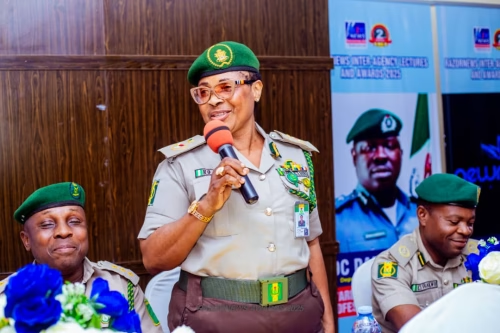
“Criminality in Nigeria has no boundary; hence all security agencies should play inter-agency roles in combating all crimes like terrorism, banditry, kidnapping, armed robbery, smuggling etc.
“Inter-agency collaboration among the various security agencies is non-negotiable.
“Collaboration and partnership among state security agencies and non-state actors like community vigilante groups have become inevitable.”
The document further urged the promotion of patriotism and nationalism among both state and non-state security actors, stressing that insecurity knows no boundary and recognises no religion.
It noted:“Promotion of the culture of patriotism and nationalism among state security agencies and non-state actors is absolutely necessary.
“Since insecurity has no boundary and does not recognize religion, tribe, political or social class, the fight against it should be devoid of sectional bias or other mundane considerations. The national interest of Nigeria with respect to security should be placed over and above religion, tribe, political affiliation or social club interest.”
Participants also resolved that greater roles should be assigned to the nation’s traditional institution in the area of community policing, noting that traditional rulers must assist in identifying and reporting criminal elements within their domains.
The communique added:“More roles should be assigned to the nation’s traditional institution with respect to community policing. Since criminal elements often live in the communities, traditional rulers should be charged with the responsibility of communal security by ensuring that any criminal elements in their midst are reported or handed over to the law enforcement.
“Traditional rulers should learn to promote welfarism in their domain by ensuring that community resources are harnessed for the good of citizens but not a few greedy individuals. For example, community lands should be utilized equitably in a manner that the average citizen has land for agricultural purposes that can lead to food security instead of a situation where some traditional rulers connive with external land grabbers to dispossess the community of its land, thereby creating food insecurity which ultimately leads to other crimes.
“Traditional rulers should upscale their awareness creation highlighting the fact that not all non-indigenes in their community are criminals. The offense of one non-indigene resident in a community should not be used to generalize that all non-indigenes in the community are criminal suspects. For example, the nomadic Fulani herdsmen had lived peacefully for years in various communities in the South of Nigeria but advent of attacks by some criminally minded Fulani crime suspect has regrettably brought fears.”
In a major policy recommendation, the document suggested that the Federal Government could consider granting amnesty to armed bandits and terrorists willing to drop their weapons, alongside structured education for the largely illiterate population of the criminals.
It stated: “The Federal Government could consider granting amnesty to armed bandits and terrorists if they are ready to drop their weapons with a subsequent education of the largely illiterate population of the killer bandits and terrorists. This is because they are highly driven by illiteracy and lack of employment.”
The communique further identified availability of illicit funds, illegal arms and ammunition, unemployment and enhancing drugs as major drivers of criminality across the country. It also decried the lack of political will to check illegal mining of solid minerals, which it described as a major source of criminal funding.
It said: “Availability of illicit funds, availability of illegal arms and ammunition and lack of employment opportunities, and availability of enhancing drugs are serious underlining reasons for the increase in number of criminals in Nigeria.
“Lack of political will to check the illegal mining of solid minerals in parts of the country e.g. mining of gold in Zamfara by unnamed retired military generals. The illegal mining is a major source of funding of criminality in those parts of the country.
“Criminality can be checked through local and international collaborations. Local collaboration includes setting of joint task forces, community policing initiative, public/private security partnership while international collaboration can include Interpol, cyber security partnership at the global level.”
It further recommended tighter military-police synergy, stating that:“The military and police can collaborate and establish a control centre where decisions on quick responses can be taken to shorten decision and action periods if the agencies are operating independently,”
while stressing that:
“The police should work out a way of collaborating with communities on how to get early and relevant intelligence that could enable field officers to reach where the criminals hibernate in community forests.”
The communique declared that: “Security is no longer territory centred but people-centric. Therefore, security forces and non-state actors, like traditional rulers, civil society organisations, religious leaders should be highly engaged in any effort to checkmate criminality in the country.”
High-level contributions also came from His Imperial Majesty, the Oluwo of Iwo, Oba Adewale Akanbi Telu I, who spoke on community-based peacebuilding and traditional conflict resolution; Rear Admiral O. A. Bankole (rtd), who represented the former Chief of Defence Staff, General Christopher Musa; and the Commissioner of Police, Lagos State, CP Olanrewaju Moshood Jimoh, who represented the Inspector-General of Police, IGP Kayode Egbetokun.
The royal father emphasized the need for traditional institutions to remain central to grassroots security management, while the military and police representatives reaffirmed the commitment of the armed forces and the police to deeper inter-agency cooperation.
The conference climaxed with the presentation of awards to deserving officers and members of the public in recognition of their outstanding service and contributions to national security.
IKPEAZU’S EX- CPS EMEMANKA AS DG, ABIA STATE STRATEGIC COMMUNICATIONS BUREAU. (PHOTO).
Posted on by admin50
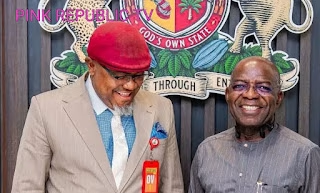
Governor Otti Appoints Ikpeazu’s ex- CPS Ememanka as DG, Abia State Strategic Communications Bureau
Abia State Governor, Dr. Alex Otti, has appointed Mr. Onyebuchi Ememanka as the Director General of the newly created Abia State Strategic Communications Bureau.
Ememanka, a seasoned media practitioner, previously served as Chief Press Secretary to the immediate past Governor, Dr. Okezie Ikpeazu, during Ikpeazu’s second term in office. In May 2025, he resigned his membership of the Peoples Democratic Party (PDP) and publicly declared support for Governor Otti’s administration.
In the same announcement, Governor Otti named Mr. Igwe Samuel Obinna as Senior Special Assistant to the Governor on New Media.
The appointments were contained in a Government Special Announcement signed by Mr. Ferdinand Ekeoma, Special Adviser to the Governor on Media and Publicity.
Both appointments take immediate effect from December 1, 2025.
Naval Officer Who Clashed With Wike Weds Heartthrob In Kaduna
Posted on by admin50

Lieutenant A.M. Yerima, the Nigerian Navy officer who became popular after his encounter with FCT Minister, Nyesom Wike has married his heartthrob in Kaduna.
The wedding video began circulating online this week, showing Yerima seated beside his bride during a traditional ceremony at her family home.
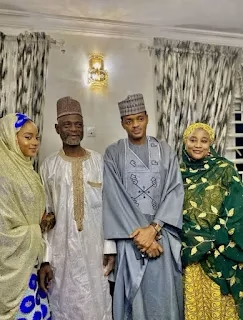

An elderly woman, believed to be a relative of the bride, sat between the couple in the usual northern setting.
Yerima gained nationwide attention when a clip of him engaging the FCT Minister over a land matter in Abuja went viral.
Many who watched the video felt he handled the situation with courage and control.
Recall that reports emerged two weeks ago that an assassination attempt was made on Yerima following his clash with FCT Minister, Nyesom Wike.
However, the spokesperson for the command, SP Josephine Adeh dismissed the claim that no incident was reported or recorded anywhere.
Reacting, in another statement, FCT police clarified that it was a normal stop-and-search process and not the assassination attempt as reported in the media.
Part of the police second statement read that: “The attention of FCT Police Command has been drawn to publications by an Instagram blogger, “Mazitundeednut,” alleging an attack on one Lt. Ahmed Yerima at NNPC junction in Kubwa area of the FCT. FCT Police Command wishes to state that these publications are false and grossly misleading.
KIDNAPPED COUPLE IN EDO STATE :POLICE LAUNCHES INTENSIVE SEARCH AND RESCUE OPERATION
Posted on by admin50
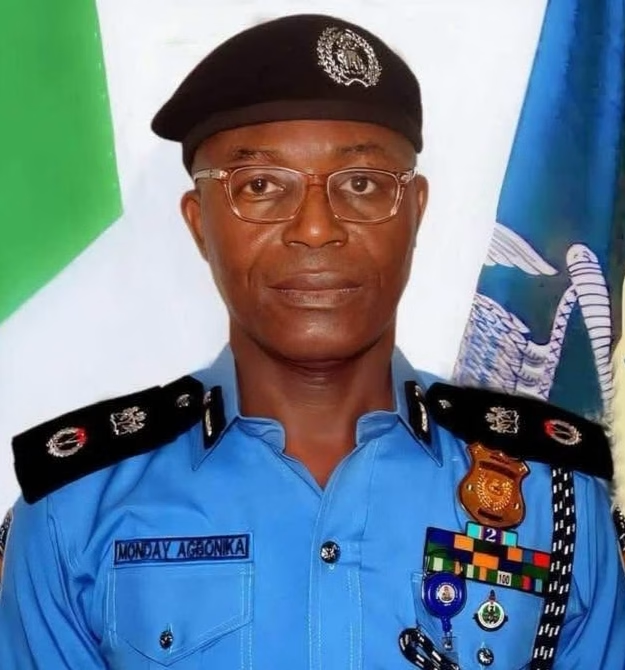
By Ebinum Samuel
The Edo State Police Command says its has been drawn to a video currently circulating on social media alleging the kidnapping of a couple in Aviele.
The Command, according to the imafe maker,CSP Joel Moses Yamu, wishes to inform the general public that upon receipt of the information, all necessary operational and investigative mechanisms were immediately activated to ensure the safe rescue of the victims and the arrest of the perpetrators.
Yamu said that the Commissioner of Police, CP Monday Agbonika, fdc has further directed a thorough investigation into the incident, and all persons found to be complicit—whether directly or indirectly—will be arrested and prosecuted in accordance with extant laws
Members of the public are advised to remain calm and continue to provide credible information that may assist ongoing investigations. The Command reiterates its unwavering commitment to the security and safety of all residents of Edo State.
Further updates, ge disclosed will be provided as the investigation progresses.
Success of UNILORIN: Pro-Chancellor, Aluko Commends Ilorin Emirate For Total Support And Acceptance
Posted on by admin50
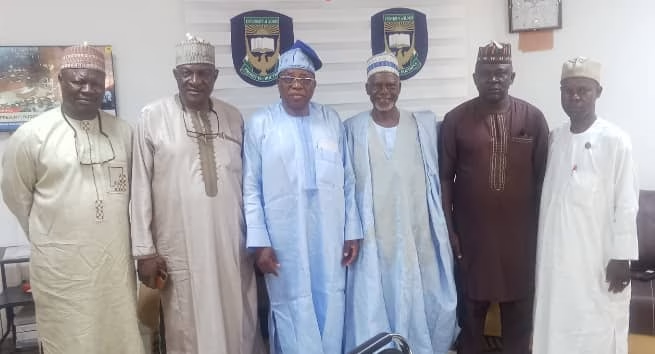
Raheem Ibrahim
The Pro-Chancellor and Chairman of the Governing Council, University of Ilorin, His Excellency, Surv. Abiodun Jacob Aluko, has commended the people of Ilorin Emirate for seeing the University as their own.
His Excellency, Surv. Aluko gave this commendation on Tuesday while receiving the National President of Ilorin Emirate Descendants Progressive Union (IEDPU), Alhaji Abdulmumini Ayo Abdulmalik, in his office.
The Chairman said that his experiences as a member of the Governing Councils of a few other universities before his current appointment showed that the people of Ilorin Emirate are fantastic hosts who do not have any problem whatsoever with the University.
Surv. Aluko, who is a former Deputy Governor of Ekiti State, said that the prevailing peace of the University and the magnitude of its achievements cannot be divorced from the fraternity of its host community.
He specifically thanked the people of Ilorin Emirate for always supporting the University as he also thanked the management of the Ilorin Central Jumaat Mosque for its decision to build a 250 bedspace hostel at the University, among other wonderful supports.
The former Deputy Governor said the Vice Chancellor, Prof. Wahab Olasupo Egbewole, SAN and the Registrar, Mr Mansur Adeleke Alfanla, as well as other Principal Officers have been leading staff and students of the University towards greatness.
The Pro-Chancellor who spoke glowingly of His Royal Highness, Mai Martaba, the Emir of Ilorin, assured IEDPU, which is the umbrella sociocultural organisation of the people of Ilorin Emirate, that the Council and management of the University would continue to work with the institution’s host community for mutual benefits.
Speaking earlier, the National President of the IEDPU, Alhaji Abdulmumini Ayo Abdulmalik, thanked His Excellency, Surv. Aluko, for working harmoniously with the University Administration.
Alhaji Abdulmalik, who is also an alumnus.of the University, congratulated the institution on its golden jubilee anniversary and commended the University’s management under the leadership of the amiable Vice Chancellor, Prof Egbewole.
He then recalled that several indigenes of the community worked with other stakeholders from the old Kwara State and across Nigeria towards the establishment of the University.
He then pointed up that the Union had always been eager to work with successive administrations of the University to ensure a prevailing peaceful environment for the institution to operate; in addition to maintaining continuous harmonious relationship between the gown and town. He explained that the Union earlier written a congratulatory letter to the Chairman shortly after his appointment.
The community leader said that the people of the University’s host community would always support the University in order for it to achieve its corporate objectives as he urged the University to continue to show more concern to the yearnings of its host community.
Alhaji Abdulmalik was accompanied on the visit by his Deputy, Alhaji AbdulRauf Babatunde Issa; the National Secretary, Abubakar Imam; the National Auditor, Mr Adam Olumide Alabere and Mr Habeeb Atanda.
Security Expert Urges Technology to Secure Nigeria’s Porous Borders
Posted on by admin50
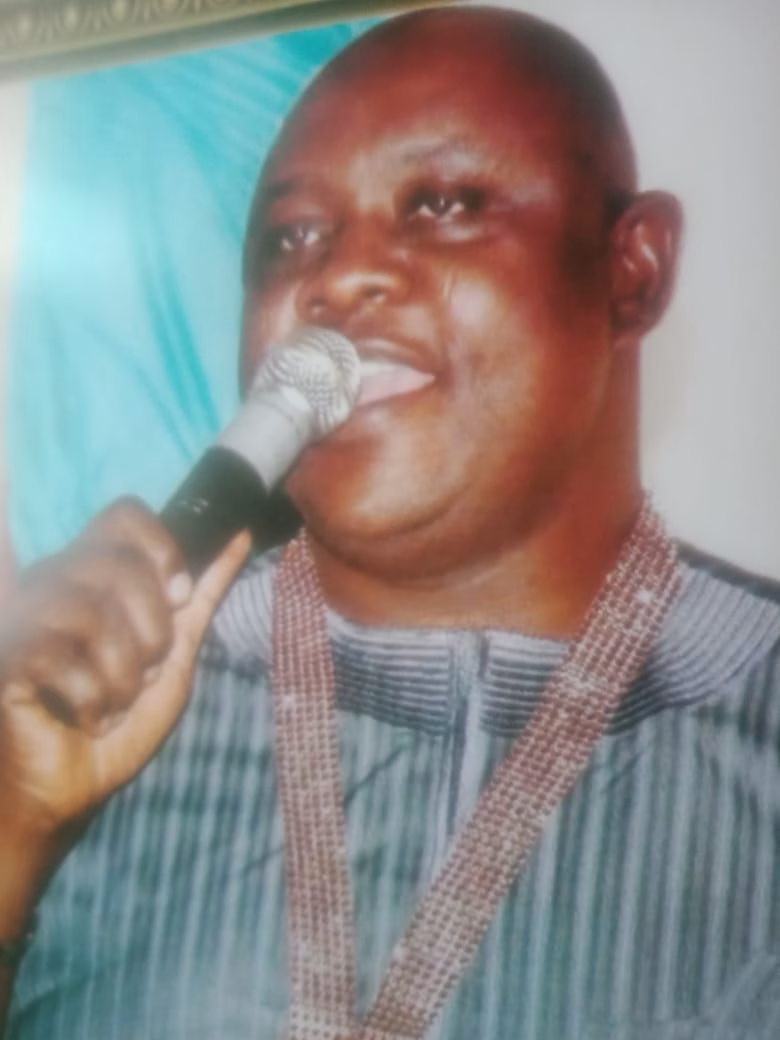
By Ebinum Samuel
Security expert Bone Efoziem has called for increased technological measures to monitor and secure Nigeria’s porous land, air, and sea borders.
Speaking at the 2025 Annual Lecture and Awards Ceremony of the Crime Reporters Association of Nigeria (CRAN) in Ikeja, Efoziem emphasized that most security threats entering Nigeria, ranging from arms smuggling to insurgency, come through unmonitored land routes rather than official airports or seaports.
He noted that many villages along the borders serve as informal entry points, making it difficult for conventional border security to function effectively.
“Almost every village around the border is a potential route into the country,” Efoziem said. “Even security officers on the ground cannot monitor all these points effectively. This is where technology, like drones and remote monitoring systems, becomes essential.”
He stressed that current equipment and manpower are insufficient to tackle insurgents and armed criminals operating along the borders.
Highlighting the limitations, Efoziem noted that soldiers often face better-equipped insurgents with night vision goggles and heavier weaponry, while border surveillance remains largely manual.
The expert called for redefining border security strategies and integrating technology to detect illegal movements, track suspicious activities, and enable rapid intervention.
He also urged community engagement platforms to allow Nigerians to anonymously report cross-border threats, improving real-time intelligence collection.
“Strengthening border security with technology is critical to reducing the flow of arms, drugs, and criminals into Nigeria,” Efoziem said, stressing that proactive monitoring is the only sustainable solution to the nation’s border challenges.
Presidential Directive On Recruitment Of 30,000 Police Officers: PSC, NPF Set up Joint Ad-hoc Committee to Drive the Process.
Posted on by admin50

The Police Service Commission (PSC) and the Nigeria Police Force (NPF) have established a high-powered joint Ad-hoc Committee to drive the immediate commencement of the recruitment of 30,000 new police personnel.
The Ad-hoc Committee, according to a press statement issued by Ikechukwu Ani, PSC spokesman, was inaugurated today, 26th November, 2025 by the Chairman, Police Service Commission DIG Hashimu Salihu Argungu (rtd) at the Police Service Commission Corporate Headquarters, Jabi, Abuja, following the presidential directive to bolster the numerical strength of the NPF and enhance national security.
The primary mandate of the Joint Ad-hoc Committee is to collaborate and brainstorm on creating a seamless, transparent, and efficient recruitment process. The committee will work to ensure the exercise is conducted with the highest standards of integrity and merit.
In his remarks, the Chairman of the Police Service Commission, who was represented by DIG (Bar) Taiwo Lakanu (rtd), fdc, stated that “the collaboration is crucial for a successful exercise”. He reiterated the Commission’s commitment to ensuring that the recruitment is fair and based on established guidelines.
DIG Lakanu is also the Chairman, Nigeria Police Force Matters Committee, PSC.
The Inspector-General of Police, who was represented by CP Edwin Eloho of the Department of Training and Development, Force Headquarters, emphasized the importance of the recruitment in strengthening the police force’s capacity to serve and protect the citizens of Nigeria. He affirmed the NPF’s full cooperation with the PSC to ensure the timely and successful achievement of this national objective.
The inauguration of this committee marks a critical step forward in the Federal Government’s commitment to addressing security challenges and improving the police-to-citizen ratio across the country.
The Police Service Commission is the Federal Executive Body empowered to appoint, promote, dismiss, and exercise disciplinary control over persons holding offices in the Nigeria Police Force, except the Inspector-General of Police.
The Nigeria Police Force is the principal law enforcement agency in Nigeria. It is designated to, amongst others, prevent and detect crime, protect lives and property, and maintain public order and safety.
King Karma is coming!
Posted on by admin50
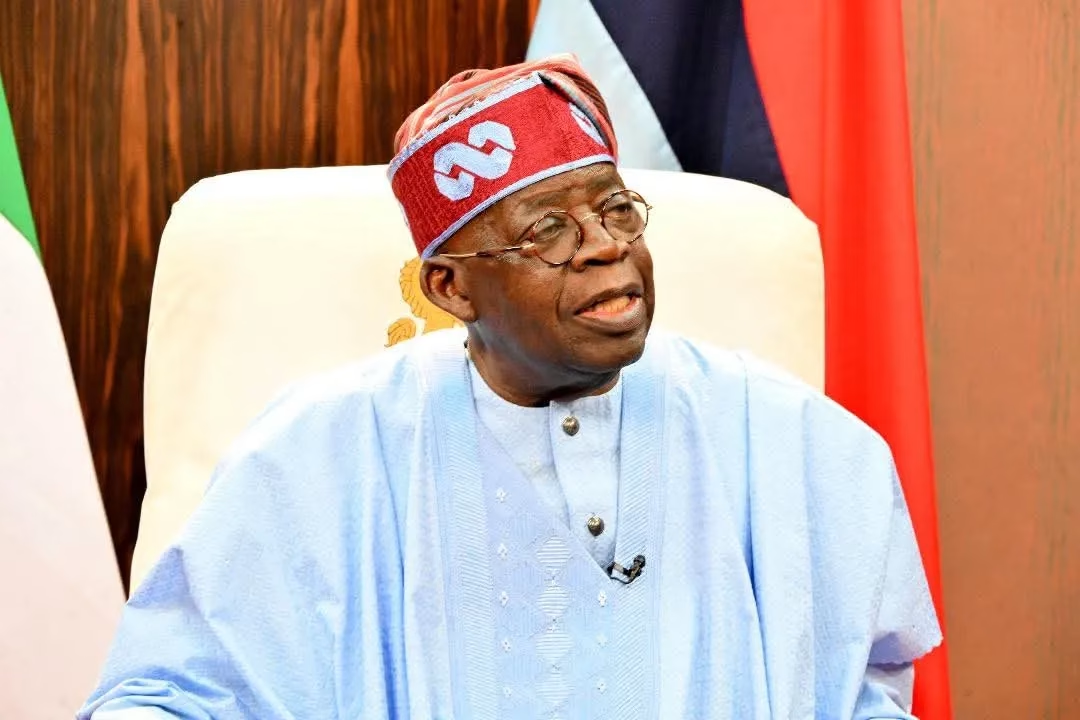
By Ayo Oyoze Baje
Quote:
“A man reaps what he sows. Whoever sows to please their flesh, from the flesh will reap destruction; whoever sows to please the Spirit, from the Spirit will reap eternal life”.
-Holy Bible (Galatians 6:7–9).
Believe it or not, the Law of retributive justice, or call it karma is real. But what does it truly mean? In Buddhism, Hinduism, and some other religions “the force produced by a person’s actions in one life that influences what happens to them in future lives: Hindus believe in karma, meaning they will answer for their actions – if not in this life, then in the next”. Most interestingly, it has started unfolding before our eyes with specific regards to Nigeria’s effervescent political spectrum, within a short space of less than two decades.
For instance, how else can we explain the harsh reality of the fact that the very set of political helmsman who trooped to the United States,US to meet with the then President Barack Obama to lay complaint of serious “insecurity” against the President Goodluck Jonathan-led government back in 2014, with some of them asking him to resign from office are currently at the receiving end of even worse insecurity ravaging the country? These same people are embittered by the President Donald Trump-led United States tagging Nigeria a Country of Particular Concern,CPC troubled by “Christian Genocide”.
That is Karma for you.
It would be recalled that a top intelligence analyst, who was part of the Obama administration, Mr. Matthew T. Page, has explained the claim made by former Governor of Niger State, Babangida Aliyu, that the State Department invited 12 northern governors to Washington to seek their support on the need to achieve regime change in Nigeria during the 2015 Presidential election.
.
Similarly, former President Goodluck Jonathan, who lost the election to President Muhammadu Buhari, knowing full well that the well staged kidnap of the Chibok School Girls was aimed at denting his image as incapable of battling insurgency,
also alleged international conspiracy in the build up to the elections. The statements of both Aliyu and Jonathan were revealed in the book, entitled ‘Against Run of Play’ by Segun Adeniyi.
.
In fact, Mr. Page alleged that,“at that meeting, Admiral Murtala Nyako read out a memo he had written itemizing the case against Jonathan. He was so openly and almost violently against the Jonathan administration in his speech that he had to be openly rebuked at the meeting by the then Nigerian ambassador to the US, Ambassador Adebowale Adefuye, of blessed memory. It was so venomous that it prompted a rebuttal from the Gombe State governor, Ibrahim Hassan Dankwambo, who showed loyalty to the then Nigerian President. According to Mr. Page, this prompted most of the other Northern governors present to turn on him.
Another intriguing aspect to the political gambit was that at the same time, Obama confidant and former White House Senior Advisor, David Axelrod’s firm, AKPD Message and Media, began to work as a paid consultant for the then Nigerian opposition party, All Progressives Congress.”Subsequently,
“sublimal messages were communicated by President Obama” in the special broadcast he made to Nigerians on March 28, 2015, urging them to come out and vote. Eventually, their nebulous aim of outsting Jonthan from power succeeded.
But well aware of the insidious plans by the desperados to unleash haunting havoc on innocent people
should he refuse to vacate office, he openly stated that: “My political ambition is not worth a drop of blood of any Nigerian”. Unforgettable demonstration of an uncommon patriotriotic fervour for a country some want to rule over more by crook thsn by hook! So, what has transpired within the insecurity matrix in the past decade, since Jonathan humbly handed over the baton of political leadership to the All Progressives Congress,APC
from 2015 to 2025? That is the million naira question. The answers are the gory pictures painted before us all to see.
Ever since, the terrorism incubus has metamorphosed from mainly the Boko Haram to the ISWAP, the bandits, the Lakurawa and the Mahmuda. It has spread from the embattled North East zone to the North Western states of Zamfara, Sokoto, Kebbi and Kaduna in addition to the mineral – rich North Central states of Plateau, Benue, Zamfara and Kwara currently
turned from the once fertile farmlands into the killing fields of Nigeria.
And some of the traducers of the then Jonathan-led administration have started exhibiting a deep sense of remorse. One of them, a chieftain of the NNPP, Buba Galadima in a recent interview with ARISE Television has this to say; ” I’m sorry that I have come here to discuss the truth, not politics. Let me address more. During Jonathan’s birthday, I spoke to journalists. And I said something. I was one of the greatest critics of Jonathan’s presidency. I didn’t know that God will disgrace me to show me that Jonathan was even a saint, a better administrator than those that came after him.
“During his time, the insecurity reached its highest level, six weeks, I mean some few days to election. Jonathan suspended the election, put off the election, and took another six weeks. And brought mercenaries. If this government today has that opportunity of chaos one or two weeks to election, they will allow it to continue so that they can write figures and announce themselves as winners. But Jonathan stopped that election, and he knew for sure that if there was a fair election, no incumbent, the government can get second term.
He added that: “This is an educated man with PhD. He knew that. But because of his humane nature, he postponed the election for six weeks, brought in mercenaries, and within six weeks, those mercenaries stabilized Nigeria, and there was no polling booth in Nigeria thar elections did not take place. If Jonathan has done that at that time, 2015, what stops this government from copying what Jonathan has done?.” That is asking for credible answers.
. Put simply, What goes around comes around, according to Karma.
Yet, according to Galadima: “This government is only concerned about receiving the decampees or trying to destroy opposition political parties. And I want to tell them that it is not in their interest to destroy opposition, because without opposition, there is no democracy. And if there is no democracy, it means we are gravitating to fascism, dictatorship. And this is exactly where they are taking a pass. ” This should serve as food-for-thought to our political leaders.
And it is all because, whether we like it or not King Karma is coming for all those who have by crass corruption in high places diverted the wealth of this God-blessed country to satisfy the self instead of the state, and all others who have thwarted the pendulum of justice to always swing in their favour against the right choices of the long-suffering people. Not left out of course, are all those blood – sucking vampires in human skin who have at one time or another armed and sponsored all manner of terrorists, or negotiated with them,
as well as the greed-driven supporters of evil that have brought us to this sordid mess.
But to others who have remained faithful to the Nigerian dream in the long search for good governance, as the Bible rightly admonishes us.”Let us not become weary in doing good, for at the proper time we will reap a harvest if we do not give up”
One thing is certain though, whatever we sow in other people’s lives, that shall we also reap because King Karma is coming for each and everyone of us.
WEEK FUNSO OWOYEMI LOCKED DOWN LAGOS FOR WIFE, DAUGHTER
Posted on by admin50

By Tunde Olusunle
Thursday January 11, 2024, all roads led to the Holy Trinity Anglican Church, Ikate, Surulere, Lagos, for the formal admission of Otunba Funso Davies Owoyemi, Fellow of the Chartered Institute of Accountants, (FCA), into the septuagenarian rungs. Those who know FDO as acronymed from the initials of his names, know him for his social unobtrusiveness and reticence. This is despite his humongous achievements as an astute professional, conscientious husband, consummate parent, devoted community leader and revered elder statesman. Turning 70 in our kind of environment with its many viccissitudes was worth giving thanks to God and inviting friends and family to join the celebration which was just what Otunba Owoyemi did on that occasion.
Nearly two years later very recently, there was compelling need for a double-barreled encore in Owoyemi’s family. It was the occasion of the engagement of one of his six delectable daughters, Oluwasolape, to her hearthrob, Precious Adeniran, on one hand, and the 70th birthday of his beloved wife, Mrs Rita Abeke Owoyemi, his inseparable partner of five decades. Beginning from Thursday October 30, 2025, therefore, Otunba Funso Owoyemi was going to lock down Lagos for the following half a week to commemorate both landmarks. And from Lagos and beyond, family, friends, associates and acquaintances rallied steadily behind the Owoyemis as they celebrated their own.

The highbrow Rosetree Event Centre, Oniru, Victoria Island, Lagos, hosted the engagement ceremony of Oluwasolape and Precious. Expectedly, it had the orderly, organised imprimatur of FDO, classy without being exhibitionist, the best of Nigerian culture on display as the two youngsters pledged their futures to each other before the world. Lagosians continue to raise the bar of ceremonial sophistry though, ever giving their upcountry guests novelties to think about. Fulfilment was writ large on the faces of the older Owoyemis who have devoted a considerable segment of their more recent years joyfully oversighting the lateral flourish of their family, with the addition of more and more grandchildren.
Sunday November 2, 2025, the Holy Trinity Anglican Church, Ikate, Surulere, was the venue of the 70th birthday thanksgiving of the Owoyemi matriarch, Chief (Mrs) Rita Abeke Owoyemi. It was a packed Sunday service which coincided with the annual “Adult Harvest” of the church, which was going to keep guests and parishioners in church for a long duration. The Rt. Rev. Akinpelu Johnson the Vicar and Archdeacon, led the proceedings. The excitement of celebrating with the Owoyemi family, despite Lagos’ typically unpredictable rain descent, however, overshadowed every proclivity to boredom and restlessness. Guests proceeded to The Podium Events Centre, Lekki, Lagos for the post-thanksgiving reception thereafter.
The socials were a celebration of the finest aspects of Nigeria’s cultures. Otunba Owoyemi’s kinsmen from Yagbaland in the Okun hemisphere in Kogi State, matched their in-laws from Owo in Ondo State with costume, dance and displays. It was a most befitting tribute to the life and multitasking career of a wife, mother, grandmother, sister and aunt, who worked her way to Nigeria’s exchequer, the Central Bank of Nigeria, (CBN), from humble beginnings. Starting out in Secretarial Studies, Mrs Owoyemi with the unflinching support of her redoubtable husband would go on to become a public administrator in her own right. She trained at the Crown Secretarial College and the Pitman’s College, both in London, where she earned a Diploma and a Higher Diploma in Secretarial Studies.
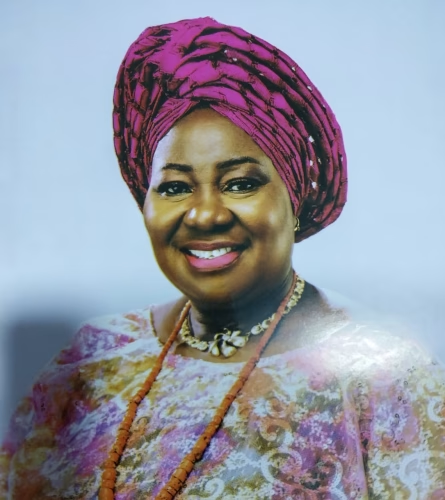
Within the same period, her husband, Otunba Owoyemi earned his badges as a charterered accountant and management professional. The couple wedded in London Borough of Hackney in 1979 and welcomed their first child, Olumuyiwa, one of their two sons, before returning to Nigeria during the regime of President Shehu Usman Shagari in 1980. Mrs Owoyemi began a lifelong career in the CBN in 1981 and grossed three and half eventful decades in service before her retirement at 60 in 2015. She has since redoubled her focus on mentoring and supporting not just her children and their offsprings, but siblings, relatives and adopted children, while also supporting her husband as they both age gracefully together.
Mrs Owoyemi’s commemoration was a harvest of testimonies from a broad spectrum of people and publics she encountered and impacted in a most eventful life. Siblings, childhood peers, schoolmates, colleagues, members of church, voluntary and social organisations, stepped forward to speak so glowingly and eloquently about a rare breed who has lived her life principally for others. The second child of her nuclear family, fate thrust leadership upon her when she lost her older sibling and she had to fill in spontaneously as Numero Uno in the family and pathfinder, a role she has played so very ably and gracefully.
The Owoyemis had very good company at the twin ceremonies. Former Ministers in the administration of former President Olusegun Obasanjo, GCFR at the programme, included Chief and Justice (Mrs) Bayo Ojo, SAN, CON, and Asiwaju and Chief (Mrs) Kola Jamodu, CFR. Prince Olusola Akanmode, Chief of Staff to former Vice President Atiku Abubakar, GCON; Arc Yomi Awoniyi, FNIA, former Deputy Governor of Kogi State; Aremo (Dr) and Chief (Mrs) Yemi Ogunbiyi, former Managing Director of Daily Times of Nigeria Plc, and Senator Musiliu Obanikoro. Rear Admiral Okanlawon Oni, (rtd); AIG Tunji Caulcrick, (rtd); Brigadier-General Benjamin Ipinyomi, (rtd); Ambassador Kayode Shinkaiye; Chief (Mrs) Florence Omotehinwa; Justice Suyi Olateru-Olagbegi and Justice and Mrs Adeniyi Ademola, (rtd), equally added colour to the event.
Mr Eniola Bello, Managing Director of Thisday Newspapers; Mr and Mrs Akin Opeodu, FCA; Mr and Mrs Kunle Owuye; Dr Kola Ibirogba; Otunba Sam Olu Owa; Chief Kunle David; Chief and Mrs Korede Adedayo; Chief Tosin Atewologun; Chief Jide Oni as well as Mr and Mrs Bayo Ibirogba, honoured the milestone. Chief Kayode Soyombo; High Chief Tobi Oduyale; Chief Sanmi Fabode, FCA; Hon Deinde Abolarin; Mr and Mrs Iyiola Oyefeso; Otunba and Mrs Babs Alatise; Engr and Mrs Owa Adewale; Captain and Mrs Ade Olopoenia; Mr and Mrs Uwa Ehanire; Elder Tunde Alogbo and Chief Tunde Odunewu, all kept faith with the Owoyemis. Not forgetting Members of “Klub D’Aspirers” and the “Long Table” respectively.
It was indeed a fitting and memorable week of landmarks which the family of Otunba Funso Davies Owoyemi, FCA, will savour and treasure for decades to come.
Tunde Olusunle, PhD, Fellow of the Association of Nigerian Authors, (FANA), is an Adjunct Professor of Creative Writing at the University of Abuja

